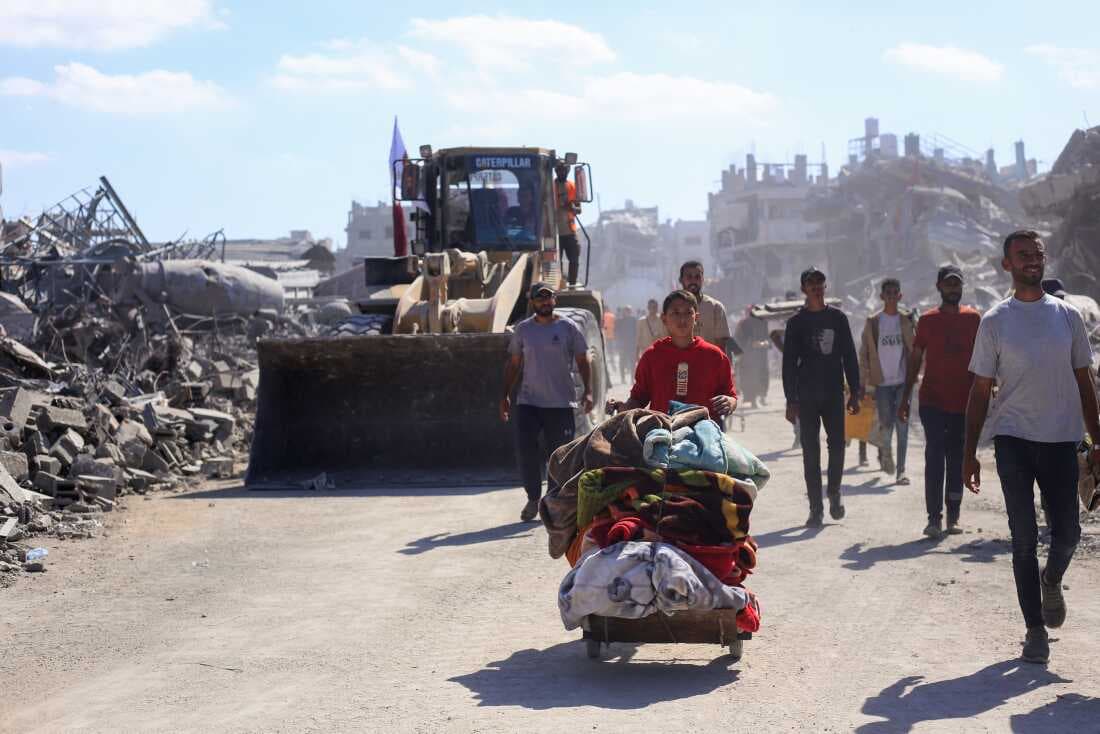We're loading the full news article for you. This includes the article content, images, author information, and related articles.
The return of two more hostage bodies to Israel by Hamas underscores the precarious nature of the Gaza ceasefire, with international pressure mounting to uphold the agreement despite significant challenges in locating remaining remains.

Hamas has returned the bodies of two additional hostages to the Israeli military, which were subsequently transferred to the Red Cross in Gaza. This development was confirmed by Israeli Prime Minister Benjamin Netanyahu. The remains are currently undergoing formal identification at a specialist centre in Israel. “All the families of the hostages have been updated on the matter, and in this difficult hour, our hearts are with them,” Prime Minister Netanyahu stated, reaffirming Israel's commitment to recovering all hostages.
This latest transfer follows the return of three bodies to Israel overnight on Tuesday, October 14, 2025. These individuals were identified as Uriel Baruch, Tamir Nimrodi, and Eitan Levi. However, Israel reported that a fourth body handed over was not one of the hostages. Funerals for the identified individuals are being held in Israel.
The current ceasefire agreement, which had a deadline for the handover of all living and deceased hostages on Monday, October 13, 2025, remains fragile. Former US President Donald Trump has indicated he would consider allowing Israel to resume military action in Gaza if Hamas fails to uphold its end of the ceasefire deal. Speaking to CNN, Trump stated that Israeli forces could return to the streets “as soon as I say the word,” adding, “What’s going on with Hamas - that’ll be straightened out quickly.”
The ceasefire agreement stipulates the return of all hostages. However, Hamas has stated that it has handed over all the remains it could readily access. The group claims that extensive efforts and specialised equipment are required to locate and recover the remaining bodies amidst the widespread destruction in Gaza.
The Red Cross has confirmed the receipt of the two coffins and acknowledged the immense challenge of the task, suggesting it could take days or even weeks, with the possibility that some bodies may never be found. US Vice-President JD Vance also acknowledged on Sunday, October 12, 2025, the difficulties in recovering all bodies.
According to Axios, citing two Israeli officials and one US official, Israel has shared intelligence with the US suggesting that Hamas has access to more bodies than it claims. Israel reportedly informed the US that Hamas is not doing enough to recover the remaining dead Israeli hostages, and that the Gaza deal cannot progress to its next phase until this changes.
Concerns have been raised by both Israeli and US officials that ultranationalist ministers within the Netanyahu government, specifically Betzalel Smotrich and Itamar Ben Gvir, might leverage the issue of hostage remains to undermine the ceasefire deal, which they oppose, and advocate for a resumption of the conflict. A US official told Axios, “Hamas will give all the bodies back, but it is going to take time. We will continue working on it but we can’t allow the deal to collapse.”
The perceived slow return of bodies and the intelligence shared by Israel regarding Hamas's access to more remains could jeopardise the fragile ceasefire. The political dynamics within the Israeli government also pose a risk to the continuation of the agreement, with potential for renewed conflict if hardline elements gain influence.
The exact number of remaining bodies and their locations remain uncertain. Hamas claims difficulty in locating some remains due to the extensive rubble and areas it no longer controls. The discrepancy between Israel's intelligence and Hamas's claims regarding the number of accessible bodies is a significant point of contention.
The effort to recover all hostages is ongoing. The Red Cross continues its role in facilitating transfers and addressing the logistical challenges of locating remains in a war-torn area.
Observers will be closely watching for further developments in the hostage recovery efforts and any statements from key international actors regarding the ceasefire's stability. The internal political discourse in Israel and its potential impact on the agreement will also be a critical area of focus. The role of international mediators in bridging the gap between Israeli and Hamas claims regarding the remaining bodies will be crucial.
Further coverage on the Gaza conflict and regional stability can be found in our international news section.
Keep the conversation in one place—threads here stay linked to the story and in the forums.
Sign in to start a discussion
Start a conversation about this story and keep it linked here.
Other hot threads
E-sports and Gaming Community in Kenya
Active 9 months ago
The Role of Technology in Modern Agriculture (AgriTech)
Active 9 months ago
Popular Recreational Activities Across Counties
Active 9 months ago
Investing in Youth Sports Development Programs
Active 9 months ago